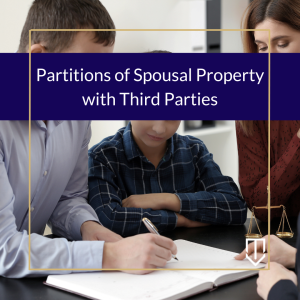 Family Code section 2021 provides that a court “may order that a person who claims an interest in the proceeding be joined as a party” to nullity, dissolution, and legal separation proceedings. (Fam.C. § 2021(a).) An interested third party may wish to join a family law proceeding, or an existing party may want to join the interested individual. An existing party may request that the court join the third party if the third party possesses or claims to own property that the court has jurisdiction over in the proceeding. (Cal. Rules of Court 5.24(c)(1).) Additionally, a third party may request to be joined if they have been served a temporary restraining order that affects their ability to use property they possess or claim to own.
Family Code section 2021 provides that a court “may order that a person who claims an interest in the proceeding be joined as a party” to nullity, dissolution, and legal separation proceedings. (Fam.C. § 2021(a).) An interested third party may wish to join a family law proceeding, or an existing party may want to join the interested individual. An existing party may request that the court join the third party if the third party possesses or claims to own property that the court has jurisdiction over in the proceeding. (Cal. Rules of Court 5.24(c)(1).) Additionally, a third party may request to be joined if they have been served a temporary restraining order that affects their ability to use property they possess or claim to own.
When will courts order joinder in Family Law?
When a claimant has a property interest at stake and is requested to be joined, the court has the discretion to decide whether the claimant will be joined as a party. (Schnabel v. Superior Court (1994) 30 Cal.App.4th 758, 762-63.) In other words, the court is allowed to deny a request for joinder even if the individual seeking it has a legitimate interest in the proceeding. This is called a “permissive” joinder. Joinders are mandatory only when the party sought to be joined has or claims physical custody or visitation of a minor child involved in the family law proceeding. (Cal. Rules of Court 5.24(e)(1).)
 California Partition Law Blog
California Partition Law Blog


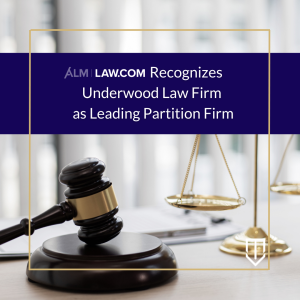 Underwood Law Firm is a finalist for the California Legal Awards’ Vanguard Award.
Underwood Law Firm is a finalist for the California Legal Awards’ Vanguard Award.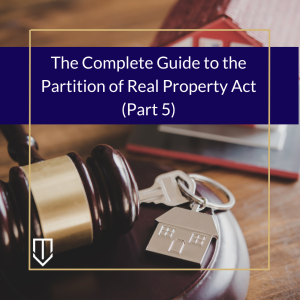 Just as there are special provisions for defaulting parties with
Just as there are special provisions for defaulting parties with 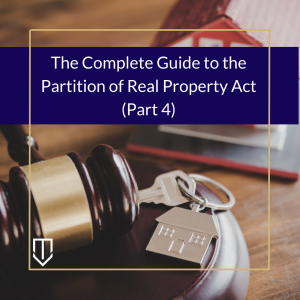 This is a continuation of our ongoing series on the Complete Guide to the Partition of Real Property Act. For complete comprehension, we would suggest
This is a continuation of our ongoing series on the Complete Guide to the Partition of Real Property Act. For complete comprehension, we would suggest  A declaration of non-monetary status is a special type of court filing reserved for trustees under
A declaration of non-monetary status is a special type of court filing reserved for trustees under 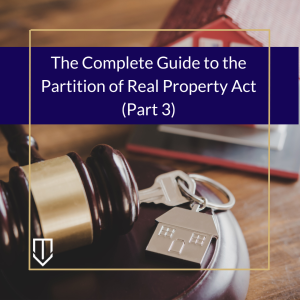 How does the court appraise the property (CCP § 874.316)?
How does the court appraise the property (CCP § 874.316)?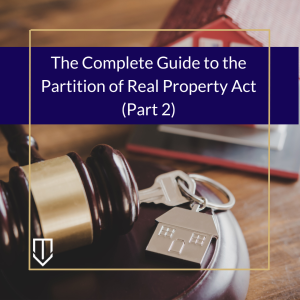
 A right of first refusal is, essentially, an option contract. It is a contract or a condition in a contract between the owner of an asset, and some other person with an interest in that same asset, that allows the interested person to buy the asset from the owner instead of allowing the owner to sell it to a third party. Put differently, it’s a conditional right to acquire property, depending on the owner’s willingness to sell. (Campbell v. Alger (1999) 71 Cal.App.4th 200, 206.)
A right of first refusal is, essentially, an option contract. It is a contract or a condition in a contract between the owner of an asset, and some other person with an interest in that same asset, that allows the interested person to buy the asset from the owner instead of allowing the owner to sell it to a third party. Put differently, it’s a conditional right to acquire property, depending on the owner’s willingness to sell. (Campbell v. Alger (1999) 71 Cal.App.4th 200, 206.) Under California’s Civil Code, real property refers to land, and things affixed to land such as houses. (Civ. Code § 658.) When people think of “property” they may envision a large lake house or a humble home. But this is only one type of property – real property. Personal property, on the other hand, is a broad term that encompasses property rights in basically everything else. A patent is property, and so are the apples that grow on trees in someone’s back yard, and so are the pipes and plumbing that run underneath someone’s house.
Under California’s Civil Code, real property refers to land, and things affixed to land such as houses. (Civ. Code § 658.) When people think of “property” they may envision a large lake house or a humble home. But this is only one type of property – real property. Personal property, on the other hand, is a broad term that encompasses property rights in basically everything else. A patent is property, and so are the apples that grow on trees in someone’s back yard, and so are the pipes and plumbing that run underneath someone’s house.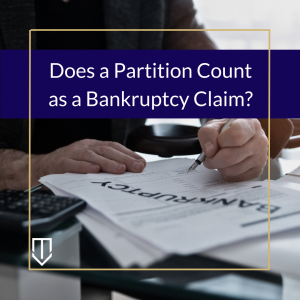 Yes, it can. Partitions and bankruptcy can interact in unusual ways despite the fact that they can often seek the same thing: the sale of a piece of property.
Yes, it can. Partitions and bankruptcy can interact in unusual ways despite the fact that they can often seek the same thing: the sale of a piece of property.